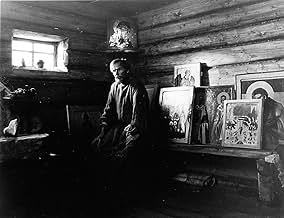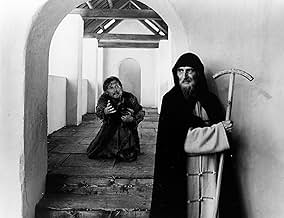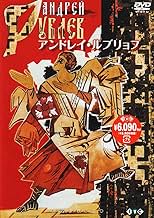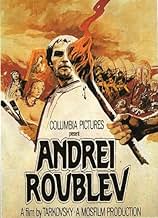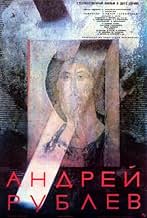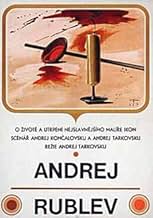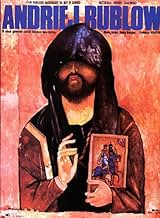The life, times and afflictions of the fifteenth-century Russian iconographer St. Andrei Rublev.The life, times and afflictions of the fifteenth-century Russian iconographer St. Andrei Rublev.The life, times and afflictions of the fifteenth-century Russian iconographer St. Andrei Rublev.
- Director
- Writers
- Stars
- Awards
- 4 wins & 1 nomination total
- Durochka
- (as Irma Raush)
- Patrikey, monakh
- (as Yu. Nikulin)
- Skomorokh
- (as R. Bykov)
- Stepan, sotnik Velikogo knyazya
- (as N. Grabbe)
- Foma, monakh
- (as M. Kononov)
- Starshiy liteyshchik
- (as S. Krylov)
- Tatarskiy khan
- (as B. Beyshenaliev)
- Aleksey, monakh
- (as A. Obukhov)
- Sergey
- (as Volodya Titov)
- Efim
- (as N. Glazkov)
- Director
- Writers
- All cast & crew
- Production, box office & more at IMDbPro
Featured reviews
Andrei Rublev was a medieval Russian iconographer; the film chronicles his struggle to maintain faith and artistry in a world of immeasurable cruelty and suffering. Rather than give us a crackerjack plot line with all the proper scene climaxes & paradigm shifts, director Tarkovsky presents us with a world in which we must immerse ourselves; once we are inside, we are confronted with rigorous pain and profound triumph. The movie is divided into chapters; the final one, involving an orphaned bell-maker's son, is a stunning film-within-a-film that provides a microcosm of the whole movie. That section, if it stood alone, would be my all-time favourite film.
Be warned: "Andrei Rublev" is SLOW. You have to slide into it; it's not a flick which dazzles, it is a world which beguiles, and which demands to be inhabited. Also, there are EXTREMELY difficult scenes to watch--torture and bloodshed abounds. Watching the Tartar attack on a Russian town is the most painful experience I've ever had--not just in a cinema, but in life.
For those willing to make the gruelling trek, however, "Andrei Rublev" is an inspiring, life-affecting experience. Created under an oppressive Soviet regime (which banned the film for years, recognizing its symbolic commentary on 20th-century Soviet government), the film shows how life can be valuable and even joyful, no matter how much suffering stands in the way.
Especially recommended for Tarkovsky fans, Dostoevsky fans, fans of medieval art, and anyone grappling with questions about suffering and human expression.
Andrei Tarkovsky released his first feature-length film, 'Ivan's Childhood,' in 1962. Even prior to its release, the director had already expressed interest in filming the life of great Russian iconographer Andrei Rublev, even though very little is actually known about his life. Working with a screenplay written by himself and Andrei Konchalovsky, Tarkvosky began filming in 1964, and a 205-minute cut was screened for a private audience in Moscow in 1966. The critical response, however, was mixed, and sizeable cuts were made to the film's running time, before a 186-minute version screened out of competition at the Cannes Film Festival in 1969. I'm not entirely sure which version I ended up watching; the time counter indicated somewhere around 165 minutes, though my brief research couldn't uncover any major missing sequences. In hindsight, I should probably have held out for longer and acquired the Criterion Collection DVD, which restores the picture to its four-hour glory. In several years' time, when I inevitably decide to revisit Tarkovsky's film, I'll make certain to do just that.
'Andrei Rublev' is divided into nine distinct segments, including a colour epilogue displaying Rublev's weathered icons as they exist today. They each explore a facet of the great painter's life, placing particular emphasis on his faith in God and how it relates to his work on frescos and icons. Interestingly, though Rublev (Anatoli Solonitsyn) himself appears in most of the stories, he is often hidden in the background, a passive observer on the behaviour of others, including Kirill (Ivan Lapikov), who is jealous of Rublev's recognition, and young Boriska (Nikolai Burlyayev), who successfully casts a bell using faith rather than knowledge. One consequence of this narrative format is a lack of cohesiveness in Tarkovsky's storytelling. We adequately follow the plot of each segment, but, as the whole, the film doesn't seem to build towards any notable climactic revelation the completed film is equal to the sum of its parts, which is still very impressive, but pulls it short of being a masterpiece. Once again, however, I must acknowledge that the 205-minute version may potentially correct this problem.
One statement that can not be disputed, however, is that 'Andrei Rublev' really is a beautiful piece of film-making. Vadim Yusov's black-and-white photography captures the exquisite delicateness of nature with almost heartbreaking intricacy; even the raindrops of a midday shower are imbued with the gentle elegance of the Heaven from which they ostensibly fell. Tarkovsky finds simple beauty in the quiver of a tree branch in the breeze, the leisurely flow of a river, herds of livestock fleeing from an aerial balloon. In portraying the complete opposite, the destruction of nature, the director is capable but not quite the master he is otherwise. The raiding of Vladimir by a troop of Tatars was obviously supposed to be the centrepiece of the picture, but Tarkovsky underplays every detail to such an extent that his "chaos" ultimately winds down into a staged conflict. Compare this sequence with Sergei Bondarchuk's burning of Moscow in 'War and Peace (1967),' in which one feels as though he has descended into the fires of Hell, and the contrast is telling.
The medieval society was deeply religious. The church influenced every aspect of people's lives from birth to death and was part of the state. It means religious leaders were as important as rulers.
In Russian society men were wearing beards and women covered hairs. Remove a beard from a man or uncover woman's hair and you will humiliate them, they would feel like modern people being undressed in public.
Paganism is a form of religion, where people believe in many gods instead of one. The main Russian pagan gods are the goddess of the earth and the god of the sun. Among others - the god of storms and lightning, the mythical young women living in forests and rivers. Despite many centuries of suppression of paganism by authorities some in modern Russia still celebrate the feast of Ivan Kupala (which could be translated as Ivan Gathering) depicted in the movie.
Also I have to mention, that Soviet censors told Tarkovski the movie is too cruel. They told him the scene with a burning cow, for example, is absolutely unacceptable. Tarkovski tried to defend the movie. The cow wasn't harmed, was his reasoning. Still the film was cut. The censors knew better what is good and what is not for the viewer.
This brings us to what is the message of Tarkovski in this film. There are many messages actually. I'll be telling only about one here, because it is not hidden. It is there, in the dispute between Rublov and Theophanes The Greek. They both are talented, both want to bring people to humanity. Theophanes is tired, he says - common people live in darkness, they are completely consumed by sin and the only way to make them humans is to scare them and punish them. Rublov advocates for love. He says: people live very difficult life, it's amazing how they endure it. We have to love them, to remind them, they are humans, they are Russians. You see, the first is the position of the Soviet system, the second - of Jesus Christ.
Me? I'm still sitting on the fence. :)
I recommend to watch this movie many times. You will do it without my recommendation though, if you (like me) will not understand everything from the first view and you like to think. The mesmerizing beauty of this movie will help you to return easier. For the first time be prepared for not a cakewalk. There are two things to consider here. One is the cruelty. Though it is absolutely necessary in this film, most of us living in a comfort of modern society are not ready to it. The other is the pace. Often it is a pace of real life.
Peace.
There are no cliches here, no stereotypes and no sucking up to the audience. A brutally honest and yet very moving, touching and optimistic film. And it is not about the nature of a genius. Rather, it is about a man's ability and duty to preserve and be true to his humanity, his freedom, his soul, his heart and his gift, no matter what century it is or what the circumstances are. Watch it to remind yourself of what it really means to be human.
Did you know
- TriviaFilm debut of Anatoliy Solonitsyn.
- GoofsThe smoothly-cut logs that feature many times in the early scenes are clearly cut with machinery not available in the early fifteenth century.
- Quotes
Andrei Rublyov: You just spoke of Jesus. Perhaps he was born and crucified to reconcile God and man. Jesus came from God, so he is all-powerful. And if He died on the cross it was predetermined and His crucifixion and death were God's will. That would have aroused hatred not in those that crucified him but in those that loved him if they had been near him at that moment, because they loved him as a man only. But if He, of His own will, left them, He displayed injustice, or even cruelty. Maybe those who crucified him loved him because they helped in this divine plan.
- Alternate versionsWhen released in the UK, the sight of a horse falling off a staircase was cut from this title.
- ConnectionsEdited into Ombres vives ...une autre histoire du cinema... (2013)
- How long is Andrei Rublev?Powered by Alexa
Details
- Release date
- Country of origin
- Languages
- Also known as
- Andréi Rublev
- Filming locations
- Production companies
- See more company credits at IMDbPro
Box office
- Budget
- RUR 1,000,000 (estimated)
- Gross US & Canada
- $124,189
- Opening weekend US & Canada
- $11,537
- Sep 15, 2002
- Gross worldwide
- $180,472
- Runtime3 hours 9 minutes
- Color
- Sound mix
- Aspect ratio
- 2.35 : 1
Contribute to this page



